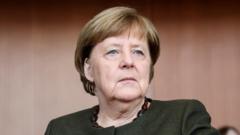The awakening of far-right sentiments in Germany is evident in the aftermath of the Magdeburg Christmas market attack, which resulted in five fatalities and heightened concerns over security and immigration policies. The alleged attacker, a Saudi refugee, voiced support for the Alternative for Germany (AfD) party, leading to intensifying political discourse and fear among migrant communities.
Reactions Surge After Magdeburg Christmas Market Attack: A Nation on Edge

Reactions Surge After Magdeburg Christmas Market Attack: A Nation on Edge
Following the tragic attack at Magdeburg's Christmas market, the response from the far-right and community sentiments underscore rising tensions in Germany.
The recent attack at the Christmas market in Magdeburg has reverberated across Germany, igniting a wave of emotions and political ramifications. Eidwicht, a local resident, recounted the harrowing experience, expressing her anxiety for her granddaughter who was present during the incident. “I feel bad, I still do,” she reflected, revealing the personal toll of the tragedy that left five dead and over 200 injured.
Authorities arrested 50-year-old Saudi refugee Taleb Al-Abdulmohsen as the principal suspect. Although the exact motive remains shrouded in uncertainty, the case has heightened tensions toward both government officials and migrant communities. Eyewitnesses relayed their terror as the car barreled through the market, leaving an indelible mark of fear in what is typically a festive environment during the holiday season.
The AfD party has seized upon the attack to further their narrative on security and immigration, with co-leader Alice Weidel delivering a speech calling for urgent changes to better protect citizens. Weidel claimed that “Magdeburg would not have been possible without uncontrolled immigration,” amid rising populist sentiments, as the party climbs in polls ahead of the federal elections set for February 2024.
This incident has revealed a fracture within German society, as residents grapple with feelings of fear and anger. Observers noted protests in Magdeburg, including a counter-demonstration organized by anti-racism groups aiming to challenge the AfD’s exploitation of the tragedy. David Begrich from Miteinander e.V. emphasized the need for solidarity rather than scapegoating, mirroring the complicated narrative around immigration and safety.
Furthermore, questions surround the adequacy of security measures at the market and how the suspect managed to bypass barriers that were meant to protect attendees. Critics have pointed out lapses in assessing the threat he posed, arguing that previous warnings about him were not appropriately addressed by authorities.
As the market tentatively resumes operations, vendors cautiously resume their activities under a cloud of grief and uncertainty. Many emotional voices from the community have called for reflection and support for the affected families. Alongside, there has been frustration directed towards journalists attempting to cover the story amid threats and hostilities from far-right protesters.
In the wake of this tragic event, the lingering question remains: how can Germany heal a society strained by fear, and what measures will be taken to ensure the safety of all its citizens?
Authorities arrested 50-year-old Saudi refugee Taleb Al-Abdulmohsen as the principal suspect. Although the exact motive remains shrouded in uncertainty, the case has heightened tensions toward both government officials and migrant communities. Eyewitnesses relayed their terror as the car barreled through the market, leaving an indelible mark of fear in what is typically a festive environment during the holiday season.
The AfD party has seized upon the attack to further their narrative on security and immigration, with co-leader Alice Weidel delivering a speech calling for urgent changes to better protect citizens. Weidel claimed that “Magdeburg would not have been possible without uncontrolled immigration,” amid rising populist sentiments, as the party climbs in polls ahead of the federal elections set for February 2024.
This incident has revealed a fracture within German society, as residents grapple with feelings of fear and anger. Observers noted protests in Magdeburg, including a counter-demonstration organized by anti-racism groups aiming to challenge the AfD’s exploitation of the tragedy. David Begrich from Miteinander e.V. emphasized the need for solidarity rather than scapegoating, mirroring the complicated narrative around immigration and safety.
Furthermore, questions surround the adequacy of security measures at the market and how the suspect managed to bypass barriers that were meant to protect attendees. Critics have pointed out lapses in assessing the threat he posed, arguing that previous warnings about him were not appropriately addressed by authorities.
As the market tentatively resumes operations, vendors cautiously resume their activities under a cloud of grief and uncertainty. Many emotional voices from the community have called for reflection and support for the affected families. Alongside, there has been frustration directed towards journalists attempting to cover the story amid threats and hostilities from far-right protesters.
In the wake of this tragic event, the lingering question remains: how can Germany heal a society strained by fear, and what measures will be taken to ensure the safety of all its citizens?






















